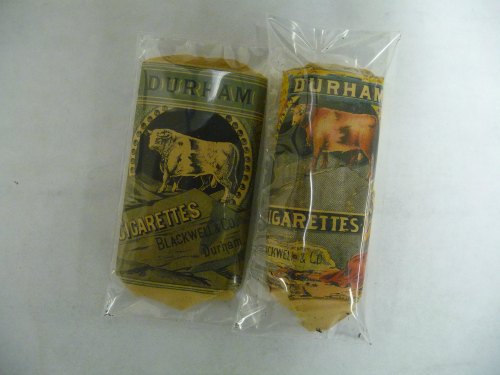As a new research services librarian at the Rubenstein Library, it’s been fascinating to explore what we have in the library. People have this idea that our collections are made up of only old books and paper, but our holdings are far more diverse than that, as I’m sure our blog readers know. Recently, a researcher was looking at a box from the Julian Shakespeare Carr Papers and when they returned the box I noticed it was oddly light and also labeled as fragile. Curious, I opened the box to find strange dark brown lumps sealed in plastic bags.


Fortunately there was small piece of paper in the box explaining that I was looking at tobacco twists from 1885 that were made in Durham, N.C. by the W. T. Blackwell & Company, which Julian Shakespeare Carr became a partner of in 1871. Tobacco twists were made by braiding and twisting tobacco leaves together into a sort of rope that could then be knotted or coiled, like these examples. While tobacco twists are strange looking today, they were one of the most common forms of tobacco in the 1800s. Consumers could cut off as much tobacco as they needed, whether it was headed for their pipe for smoking or straight into their mouths for chewing.

However, in the late 19th century Americans began to move away from chewing tobacco and pipes toward cigarettes. This box contains another Blackwell & Company product: Bull Durham cigarettes. These cigarettes are still wrapped in their paper pack, so you can’t get a good look at them, but if you could you would find filterless, hand-rolled cigarettes. At this time the cigarette production hadn’t been mechanized so it was an incredibly time-consuming and labor-intensive process. Even the best factory workers were only able to roll 4 or 5 cigarettes a minute.
Blackwell’s competitor and Durham neighbor, W. Duke, Sons & Company pioneered the use of the recently invented cigarette rolling machine in 1884, enabling them to produce up to 200 cigarettes a minute from one machine and sell those cigarettes at a substantially lower cost. By the end of the century W. Duke, Sons & Company became the dominant tobacco company in Durham and the country, and Blackwell & Company and its Bull Durham brand eventually ended up as part of the Duke’s growing tobacco empire.
Post contributed by Kate Collins, Research Services Librarian.



That’s a nice piece of history! Thanks for pictures.